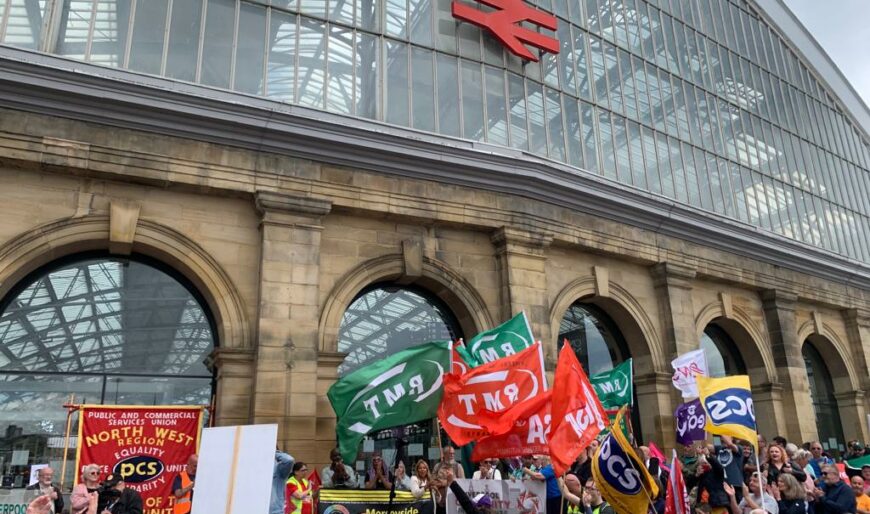Strikes Bill back in the Commons: reaction inside & outside Parliament
MPs vote down Lords amendments as the Minimum Service levels legislation reaches it's last stages

The Government’s Strikes (Minimum Service Levels) legislation returned to the Commons chamber yesteray evening, after suffering defeats in amendments tabled by the House of Lords. During a debate in the Commons, opposition MPs were scathing about the proposed anti-strike laws and highlighted the human rights implications of the changes.
The debate was introduced by Business Minister, Kevin Hollinrake, who said:
“This bill was introduced with the intention of balancing the ability to strike with the rights and freedoms of the public, by applying minimum service levels on strike days to protect the lives and livelihoods of the public.
We should not ignore the fact that the economic costs of these strikes have been estimated at around £3 billion, and much of that impact falls on business sectors that are already facing difficulties, such as the hospitality sector.
The bill brings the UK into line with many other countries: Spain and France have statutory minimum service levels in ambulance services and they also, along with Belgium, have statutory minimum service levels in fire services. In some countries, such as the United States of America, Australia and Canada, some services are prohibited from taking any strike action altogether. However, the government are not suggesting we go that far.”
In the debate, Wansbeck MP Ian Lavery said:
“I have mentioned the resistance that will be shown in this country if we start sacking the nurses, the teachers and the posties. Blaming the posties for breaking the universal service obligation; blaming the teachers for education in their classes; blaming the nurses for the backlog – you name it, that is what the bosses will do. That will start under this legislation, as they will have the power to sack people.
There will be resistance like we have never seen before. The difference is that the public are on the side of the workers on this one, so be ready.
“How can the government expect a trade union to take responsibility for individuals who might not want to accept a basic human right? It is bizarre. It is absolutely crazy.”
Labour’s Deputy Leader and Shadow Secretary of State for the Future of Work, Angela Rayner said:
“How will threatening key workers with the sack in the middle of an unprecedented recruitment and retention crisis do anything to provide the level of services that the public deserve?
We will also hear tonight that the Bill brings us into line with international standards, but what does the Minister have to say to the ILO’s director general who slammed down the Bill in January? The Minister did not effectively answer the questions that were put to him during his opening statement. What does he say to President Biden’s labour Secretary, who also raised concerns?”
Mick Whitley, Labour MP for Birkenhead, also talked about the international condemnation of te Bill:
“Not for the first time, this Government have suffered the ignominy of being condemned by the international community for their deviation from democratic norms, with 121 politicians from more than 18 countries recently condemning what they described as the “the UK Government’s attempt to limit workers’ rights and its attempt to justify it with comparisons to international norms.””
The SNP’s Chris Stephens said:
It seems that the unelected House—the comrades in ermine down the corridor—has a greater understanding of what happens in workplaces across these islands than the Government do, and we can see that in some of the amendments. It is quite incredible that the Government oppose an amendment that would make it the employer’s responsibility to serve a work notice. The Government then say that they want to keep the measures in the Bill for dismissing a worker. This is quite incredible.
Unite national officer Onay Kasab told Sky News that the legislation is “unworkable, undemocratic and unnecessary”, particularly in the NHS where the government should be “talking about safe staffing levels every day of the year”, not only during strike action.
Outside Parliament, FBU’s general secretary Matt Wrack told the crowd gathered to protest about the right to strike:
“It’s outrageous that the government has ridden roughshod over the opposition by these key workers, who took to the streets outside parliament to protect their right to strike in defence of jobs and wages.
However, this vote in parliament is not the end of the fight against this authoritarian and undemocratic assault on employment rights. Far from it. A mass campaign of opposition and defiance can make this law unworkable and ultimately defeat it.”
RMT general secretary Mick Lynch called on workers to “unleash a mass campaign of workplace disobedience and defiance” if the strikes bill is enacted.
Eddie Brand from UNISON London Ambulance Service branch, which has taken action four times in the last year, spoke at the protest. Addressing the crowds, Mr Brand said: “The very same members who were called NHS heroes, they now want to attack for taking part in democratic lawful industrial action.”
Paul Nowak, general secretary of the Trades Union Congress (TUC) – which organised the rally, also hailed the necessity of a “new deal” for workers:
“If this Government won’t deliver that new deal for working people we’re going to make them pay the electoral price for 13 years of these spiteful attacks on working people, 13 years of decimating our public services, 13 years of reducing our pay and holding down our conditions.”
Joint general secretary of the National Education Union (NEU), Kevin Courtney, told the crowd that the Government wants to “continue with Margaret Thatcher’s trajectory”.
“It is just not right, not fair that nurses are using foodbanks. It’s not right, it’s not fair that school support staff are using foodbanks and any decent government, any decent set of ministers would acknowledge that and they would begin an emergency programme to put it right.
But this Government instead wants to continue in the same direction it’s been on since 2010 of cutting of public services, preparing them for privatisation and cutting our wages. They want to continue with Margaret Thatcher’s trajectory.”







